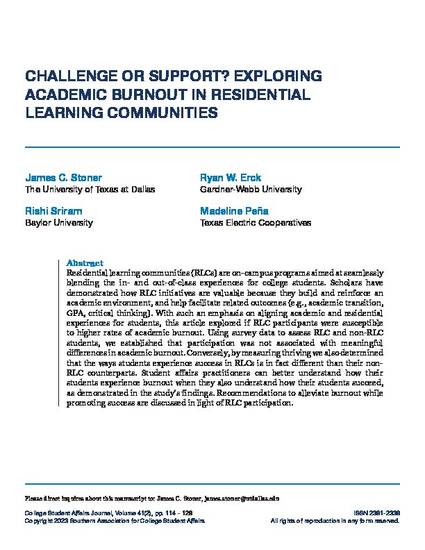
Article
Challenge or support? Exploring academic burnout in residential learning communities
College Student Affairs Journal
(2023)
Abstract
Residential learning communities (RLCs) are on-campus programs aimed at seamlessly blending the in- and out-of-class experiences for college students. Scholars have demonstrated how RLC initiatives are valuable because they build and reinforce an academic environment, and help facilitate related outcomes (e.g., academic transition,
GPA, critical thinking). With such an emphasis on aligning academic and residential experiences for students, this article explored if RLC participants were susceptible to higher rates of academic burnout. Using survey data to assess RLC and non-RLC students, we established that participation was not associated with meaningful
differences in academic burnout. Conversely, by measuring thriving we also determined that the ways students experience success in RLCs is in fact different than their non-RLC counterparts. Student affairs practitioners can better understand how their students experience burnout when they also understand how their students succeed,
as demonstrated in the study’s findings. Recommendations to alleviate burnout while promoting success are discussed in light of RLC participation.
Keywords
- living-learning programs,
- residential learning communities,
- academic burnout,
- college student success
Disciplines
Publication Date
2023
DOI
https://doi.org/10.1353/csj.2023.a916695
Citation Information
Rishi Sriram. "Challenge or support? Exploring academic burnout in residential learning communities" College Student Affairs Journal Vol. 41 Iss. 2 (2023) p. 114 - 128 Available at: http://works.bepress.com/rishi_sriram/71/
